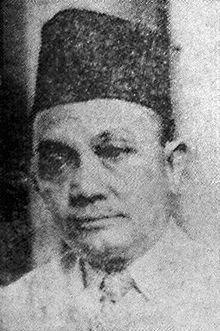Fakih Usman
|
Kyai Hajji Fakih Usman |
|
|---|---|

Fakih in 1952
|
|
| 2nd Minister of Religious Affairs of the Republic of Indonesia | |
|
In office 21 January 1950 – 17 August 1950 |
|
| President | Sukarno |
| Prime Minister | Abdul Halim |
| Preceded by | Masjkur |
| Succeeded by | Post dissolved |
| 6th Minister of Religious Affairs of Indonesia | |
|
In office 3 April 1952 – 30 July 1953 |
|
| President | Sukarno |
| Prime Minister | Wilopo |
| Preceded by | Wahid Hasyim |
| Succeeded by | Masjkur |
| Personal details | |
| Born |
2 March 1904 Gresik, Dutch East Indies |
| Died | 3 October 1968 (aged 64) Indonesia |
| Citizenship | Indonesian |
| Political party | Masyumi Party |
| Occupation | Muhammadiyah Council Member |
| Religion | Islam |
Kyai Hajji Fakih Usman (also Faqih Usman; [faˈkɪh ʊsˈman]; 2 March 1904 – 3 October 1968) was an Indonesian Islamic leader and politician with the Masyumi Party. He twice served as the Minister of Religious Affairs: under the Halim Cabinet in the State of the Republic of Indonesia in 1950, and in the national government during the Wilopo Cabinet from 1952 to 1953. In his early years Fakih was criticised by conservative Muslims for his involvement with the modernist Islamic organisation Muhammadiyah, though that group remembers him warmly.
Born to a merchant and his wife in Gresik, Dutch East Indies, Fakih studied with his father and at a series of pesantren (Islamic boarding schools) until the 1920s. In 1925 he became involved with the Muhammadiyah, rising quickly through the leadership until he became the head of the Surabaya branch in 1938. He was also active in local politics. When a group of Islamic organisations formed the Indonesian Islamic Assembly in 1937, Fakih became treasurer. He continued to be involved in politics and Islamic groups during the Japanese occupation and ensuing national revolution. While serving as minister of religious affairs, he oversaw educational and institutional reform, growing in prominence within the Muhammadiyah. He served as deputy chairman of the organisation under several different leaders before being chosen as its chairman in late 1968, several days before his death.
Fakih was born in Gresik, East Java, Dutch East Indies, on 2 March 1904. His father, Usman Iskandar, was a wood merchant, and his mother, a housewife, was the daughter of an ulama (scholar of Islam). The couple, who were of modest means, had four other children, and the family's lack of a noble background meant the children were ineligible to receive an education at Dutch-run schools. Instead, Fakih studied Islam from a young age, receiving much of his instruction from his father. At the age of ten he began studying at a pesantren (Islamic boarding school) in Gresik, finishing four years later. In 1919 he continued his studies at several pesantren outside the city, including ones in rural Gresik and in nearby Bungah.
...
Wikipedia
